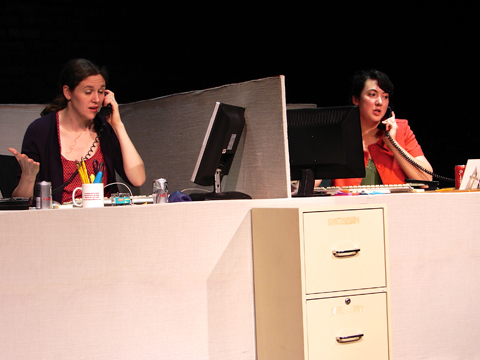
WORKERS’ PLAYTIME Hendrix and Bowler. |
A two-person female Hamlet set in contrast to the drudgery of office work? Were the play and the setting picked from two hats? What's next — Macbeth on a construction site? King Lear in a laundromat?
But not only does Leigh and Melissa Present: Hamlette rescue itself from arbitrariness, it's a delight. The independent production runs at the Empire Black Box, the AS220 performance space, through September 30.
The little theatrical ditty grew out of a late-night performance sketch the local duo threw together last fall. It makes fun of the process and aspirations of theater as only people who love the endeavor can do.
Although Leigh Hendrix and Melissa Bowler are playing invented characters rather than themselves, the office drones we meet are named Leigh and Melissa and inhabit adjoining cubicles. Unfortunately, things begin with an offputting implausibility: we are supposed to believe that although Leigh has been working in the accounting department for six months, Melissa doesn't recognize her when they encounter. (The unlikeliness is exacerbated by the partition between their desks being low. But perhaps office efficiency demanded that everyone scoot around in their swivel chairs rather than stand up.)
Not to worry. Things proceed from there entertainingly, starting with each sneaking away from a "Team-Building Day" seminar. Both pretend to be getting something out of it, until they loosen up and get real. The trust continues as Melissa teaches her new friend to not take her assigned busywork seriously and certainly never hand it in early.
Various twentysomething traits get made fun of, in the good-natured way of those who have lived the foibles. There's a lengthy exchange where each justifies being stuck in her day job. Melissa says she's a standup comedian but gets vague about her next gig when Leigh eagerly asks when she can catch her next show. Similarly, self-declared actor Leigh changes the subject when asked about going for auditions. Both sneer at the prospect of becoming "pigeonholed" by success. Each rails against such a prospect — getting tapped for a sitcom after nightclub discovery and becoming "the face of Revlon" after commercial acting — when we know they dream of those opportunities.
They start rehearsing Hamlet after work, with hopes of performing it publicly. The choice of play fits not only because it's mostly two-person scenes but also because, Leigh points out, it "defines masculinity."
Their interplay is frequently funny, extending into a farcical reminder of John Cleese's Ministry of Funny Walks when Leigh wants to demonstrate that she can perform contrasting characters. Solving the problem of multiple-character scenes in Hamlet results in the most hilarious scenes in Hamlette. The visually uproarious crowd-pleaser is when Leigh demonstrates how this could be done with sock puppets. Melissa's understated reaction makes it even funnier as she very patiently, diplomatically, tries to convince Leigh that perhaps that solution is not the best one.
Melissa's restrained character, contrasting with Leigh's enthusiasm, gives this little play more impact than it might otherwise have, bringing it down to earth. It also has some interesting character development for Melissa, starting with her self-serving excuse to the bosses for being there after hours; that lays the groundwork for a decision she makes that more fully defines her for us. There is more relationship ebb and flow between the two that keeps us interested, such as when they have a falling out when Melissa overhears Leigh upset on the phone to her mother. Wisely, we don't get a reconciliation scene, just one with the two friends fencing with Swisher handles.